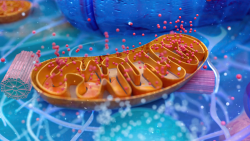Together with Dr. Lonsdale, I am proud to announce the release of our new book: Thiamine Deficiency Disease, Dysautonomia, and High Calorie Malnutrition.
If you have followed our blog, Hormones Matter, for any amount of time, you’ll know that we spend a lot time writing about mitochondrial distress. Mitochondria are the engines that fuel our cells and sit at the nexus of health and disease. Healthy mitochondria do much to stave off disease, allowing the body to survive all manner of modern stressors, from illness to toxicant exposures, and everything in between. Unhealthy mitochondria, on the other hand, can set into motion a series of reactions leading to complex, multisystem illnesses that modern medicine often has no earthly idea how to treat. This book is about those illnesses and the mitochondrial cascades that allow their existence.
We cover the chemistry of illness from the mitochondria upwards through the autonomic system, to the symptoms and back again. It is a chemistry that we seem to have forgotten in recent years, a chemistry we like to ignore when it contradicts our presumptions about pharmaceutical medicine and diet, and a chemistry that kicks us in the butt when we deny its importance. The chemistry is complicated on its surface, but a deeper dive reveals what Dr. Lonsdale refers to as ‘the exquisite simplicity‘ of health and disease. This book will teach you that chemistry and much more.
Why Thiamine? Why Now?
Thiamine takes center stage in this book, not because it is a magic vitamin that cures all, but because it sits atop the mitochondrial energy pathways. It is a gatekeeper of sorts, determining if or how other downstream mitochondrial functions proceed. For some inexplicable reason, amid all the research on the importance of other nutrients, we seem to have forgotten thiamine. Over and over again, we are presented with cases on Hormones Matter of overt thiamine deficiency, and yet, rarely do physicians consider it. More often than not, it is the patients or their caregivers that figure it out.
Why don’t we consider one of the most fundamental units of health? The short answer, if we are honest with ourselves, pharmacology and surgery are far sexier than nutrition. Unfortunately, however, disease processes do not develop because of drug deficiencies or a lack of surgical prowess. In the Western world, they develop in large part because of nutrient deficiencies within the context of high calorie malnutrition and in conjunction with other stressors. Understanding the chemistry that decides health or disease is critical to achieving health. A key component of that chemistry involves thiamine. This book details how to recognize, evaluate, treat, and understand thiamine deficiency. It is a complicated topic, but written for a broad audience.
Buy Now and Receive a Discount
For a limited time, the publisher is offering a 30% discount off of the list price and free shipping if the book is ordered from their site. Just click the link below enter the promotional code ATR30 at checkout.
Thiamine Deficiency Disease, Dysautonomia, and High Calorie Malnutrition
The discount does not apply to Amazon orders.
For a preview of the book, click the preview button under the right side bar image.















